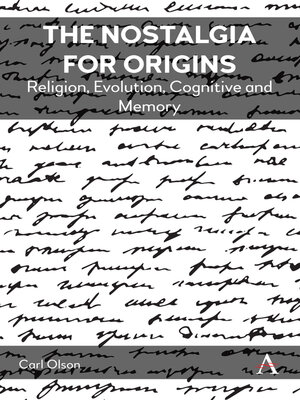
Sign up to save your library
With an OverDrive account, you can save your favorite libraries for at-a-glance information about availability. Find out more about OverDrive accounts.
Find this title in Libby, the library reading app by OverDrive.



Search for a digital library with this title
Title found at these libraries:
| Library Name | Distance |
|---|---|
| Loading... |
Using the theme of nostalgia for origins, this work proposes to examine the origin of religion within the context of the theory of evolution and the development of the human brain. It is argued that Darwin's concept of natural selection gives the impression of making Homo sapiens passive recipients of the process of evolution. To overcome this false impression and conform to the spirit of Darwin's theory, this work proposes to supplement Darwin's theory by introducing a will to power into it that gives Homo sapiens agency to gain power and empower themselves to survive. This achievement of empowerment has important consequences because it gives Homo sapiens an opportunity to invent religion and supernatural beings by means of their intuitive experiences, performing like natural by-products of the operation of evolution. The human body and brain play essential roles in the process of evolution and development of religion, a form of power that binds humans to transcendent powers, empowers them, unites them into enduring social units, represents one of the elements of the beginning of human culture, and enhances their chances for survival. Because of its subject matter and approach, this work includes a critical appraisal of scholars using the results of cognitive science research. Because Homo sapiens invented supernatural beings and religion, it seems irresponsible for a contemporary individual to choose to become an atheist, an option that is explored in the final chapter about whether religion has a future.
|This book proposes to examine the nature of religion by seeking its origin within the context of the theory of evolution and the development of the human brain. It is argued that religion is the way the mechanism of natural selection in the theory of evolution operates to help humans survive in the context of a dangerous and hostile world. Survival is accomplished when profound experiences like trance cause a rewiring of the brain, giving birth to what later is identified as religious attitudes and ways of behaving. It is possible to speculate that without the development of religion, humans might not have survived to create cultures and civilizations. Therefore, the development of religion makes it possible for early humans to thrive. This evolutionary process involved adaptation to one's environment, creation of social groups, and development of the body and the brain.
There are also other neglected aspects of evolution not discussed by previous theorists. The implications of the embodied nature of human beings are not always stressed by cognitive theorists. What they more specifically tend to neglect is that human bodies are chemical factories. It is numerous chemicals created within the body that contribute to the development of religious experiences. Another neglected aspect of those influenced by the theory of evolution is that early humans exerted a will to power to survive. This so-called will to power is a process of empowerment with the goal of enabling humans to become strong and powerful enough to survive. This will to power is not something metaphysical but is rather part of the dynamic of natural selection. It is possible to think of the proposed will to power within the operation of evolution as a thought experiment with the goal of enriching the theory of evolution.
With a review of the so-called Big Bang theory about the beginning of the universe, Darwin's theory of evolution, the quest for the birth of religion, and the cognitive contribution to this quest, the initial chapter commences a major theme of this book, namely the importance of origins. It includes an examination of the problematic nature of religion from a comparative...







